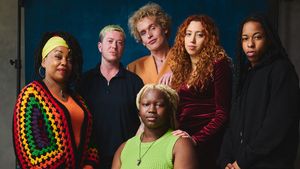Treatment GuideJust DiagnosedSex & DatingAfrican AmericanStigmaAsk the HIV DocPrEP En EspañolNewsVoicesPrint IssueVideoOut 100
CONTACTCAREER OPPORTUNITIESADVERTISE WITH USPRIVACY POLICYPRIVACY PREFERENCESTERMS OF USELEGAL NOTICE
© 2025 Pride Publishing Inc.
All Rights reserved
All Rights reserved
Scroll To Top
By continuing to use our site, you agree to our Privacy Policy and Terms of Use.
New York-based reporter and photographer Julie Turkewitz jumps at the opportunity to talk to other people living with HIV and AIDS activists outside of the Big Apple. While HIV is a serious affliction wherever it exists, many HIV-positive New Yorkers have better access to care and support than those who are more isolated, without access to basic medication. So when she met members of AIDS Action in Mississippi, an organization working to break down stigma and get the state to do a better job at funding care programs, she was moved to capture the faces and stories of people she met there. What most inspires Turkewitz about her subjects in her photo series, Scarred By Stigma, is their tenacity in their work as activists and in their lives, despite the hurdles they face. 'They are really saying, 'This is a part of me, but it's not who I am,'' says Turkewitz, a staff writer for the AIDS and poverty advocacy group Housing Works. Mississippi is far from a paradise for well-being. For the past two decades, the state has been consistently ranked as one of the least healthiest states in the country by insurance company United Health. HIV-positive Mississippians face a high poverty rate, housing discrimination, and a lack of access to medical care spurred by institutionalized prejudices, according to an extensive report on people living with HIV/AIDS in Mississippi, released in March by Human Rights Watch. And these concerns don't even touch upon the rampant stigma and discrimination that HIVers feel on a day-to-day basis at home, at the office, or even among friends. In fact, Turkewitz says that speaking to the group of Mississippians harkened back to the early days of the mysterious AIDS virus, when many people acted out of fear rather than understanding. 'When people started telling me their stories, it felt like I was hearing all of these things that came about in the 1980s when no one knew anything about HIV/AIDS,' she says. With this series, Turkewitz hopes to put a real face on the epidemic by enlightening people who have HIV-positive co-workers, friends, and family members. The goal is to reduce stigma, to humanize the disease, and to make tangible the struggles of marginalized HIVers. Government decision-makers and community leaders are a target audience as well. 'The government is the leader,' Turkewitz says. 'They set the tone. If they treat people with HIV without respect, other people are going to treat them the same way.' See more of Turkewitz's work at JulieTurkewitz.comPage 1 | Page 2 | Page 3 | Page 4 | Page 5
From our Sponsors
Most Popular
Lexi Love comes out as HIV+ after Trump deletes federal resources
January 23 2025 11:23 AM
Grindr is reminding us why jockstraps are so sexy and iconic
May 02 2025 5:36 PM
BREAKING NEWS: Trump admin moves to end federal HIV prevention programs
March 18 2025 6:10 PM
Trump's orders prompt CDC to erase HIV resources
January 31 2025 5:29 PM
Celebrating Black History Month with our annual African American issue
February 01 2025 3:28 PM
Tyler TerMeer vows to continue to fight for health care for all
January 28 2025 3:00 PM
Discover the power of Wellness in your life
March 26 2025 12:41 PM
Plus: Featured Video
Latest Stories
Dancer. Healer. Survivor. DéShaun Armbrister is all of the above
July 02 2025 8:23 PM
Two right-wing Supreme Court justices signal they may uphold access to PrEP and more
April 21 2025 4:10 PM
Broadway's best raise over $1 million for LGBTQ+ and HIV causes
April 03 2025 7:15 PM
Plus nominated for 2025 GLAAD Media Award
January 22 2025 12:42 PM
'RuPaul's Drag Race' star Trinity K Bonet quietly comes out trans
December 15 2024 6:27 PM
AIDS Memorial Quilt displayed at White House for the first time
December 02 2024 1:21 PM
BREAKING: Supreme Court rules to save free access to preventive care, including PrEP
June 27 2025 10:32 AM
1985: the year the AIDS crisis finally broke through the silence
June 26 2025 11:24 AM
Trump admin guts $258 million in funding for HIV vaccine research
June 03 2025 3:47 PM
500,000 Children at Risk: PEPFAR Funding Crisis
April 08 2025 3:51 PM
The Talk Season 5 premieres this spring with HIV guidance for the newly diagnosed
March 26 2025 1:00 PM
Jess King is here to help you live your happiest, healthiest life yet
March 24 2025 4:35 PM
A camp for HIV-positive kids is for sale. Here's why its founder is celebrating
January 02 2025 12:21 PM
VIDEO: A man living with HIV discusses his journey to fatherhood
June 10 2025 4:58 PM
HRC holds 'die-in' to protest Trump health care cuts
April 28 2025 2:11 PM
Season 4 of The Switch on resilience & radical self-love returns this spring
March 26 2025 12:20 PM
Gerald Garth is keeping people of color happy and healthy through trying times
March 11 2025 3:38 PM
This long-term HIV survivor says testosterone therapy helped save his life.
December 16 2024 8:00 PM
Ricky Martin delivers showstopping performance for 2024 World AIDS Day
December 05 2024 12:08 PM
Trending stories
Recommended Stories for You














































































